Following Student-Led Demonstration, Board Commits Several Million to Funding Campus Mental Healthcare
In light of recent student deaths, the Santa Clara community demands improved mental health resources, condemns administration’s response to the tragedy
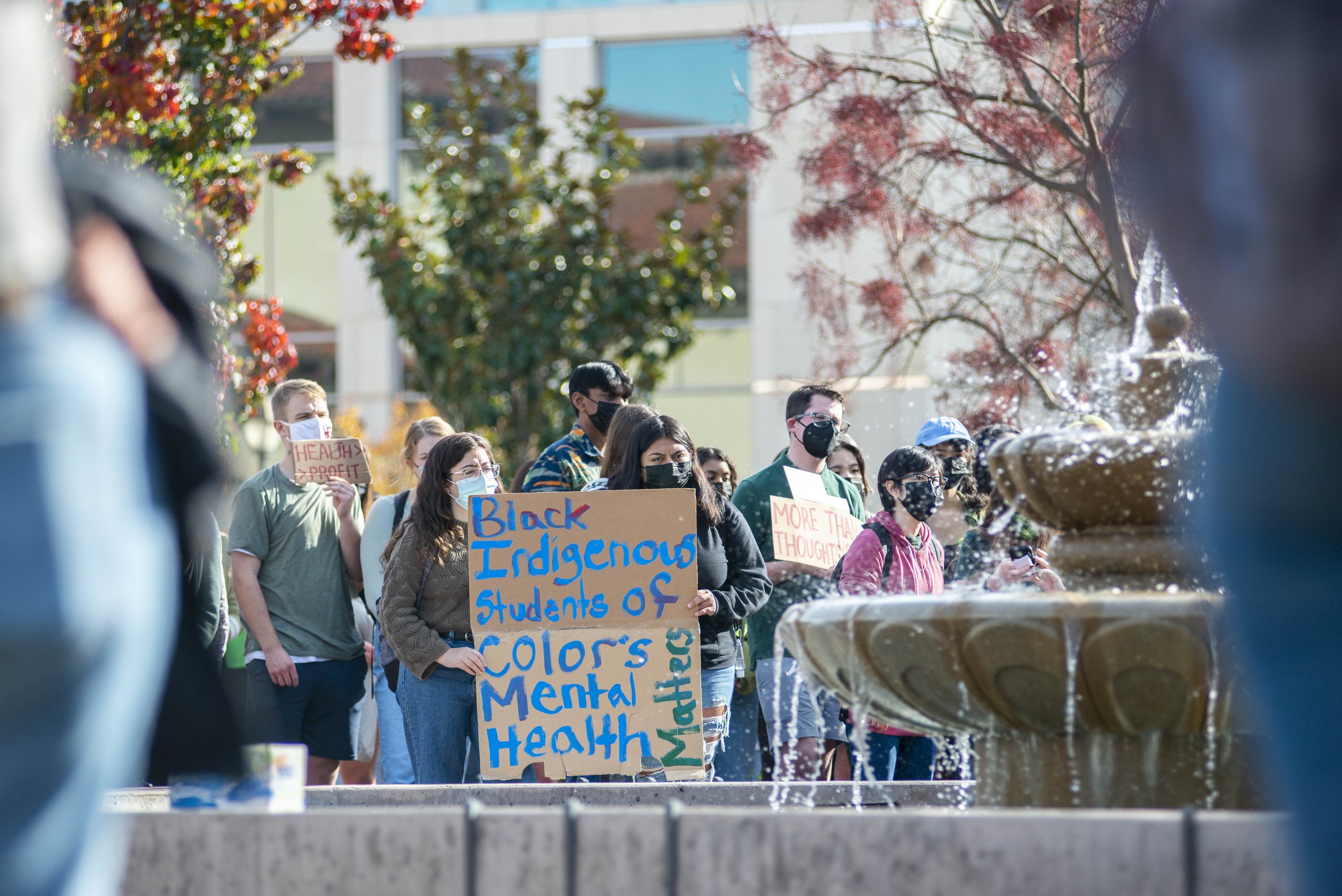
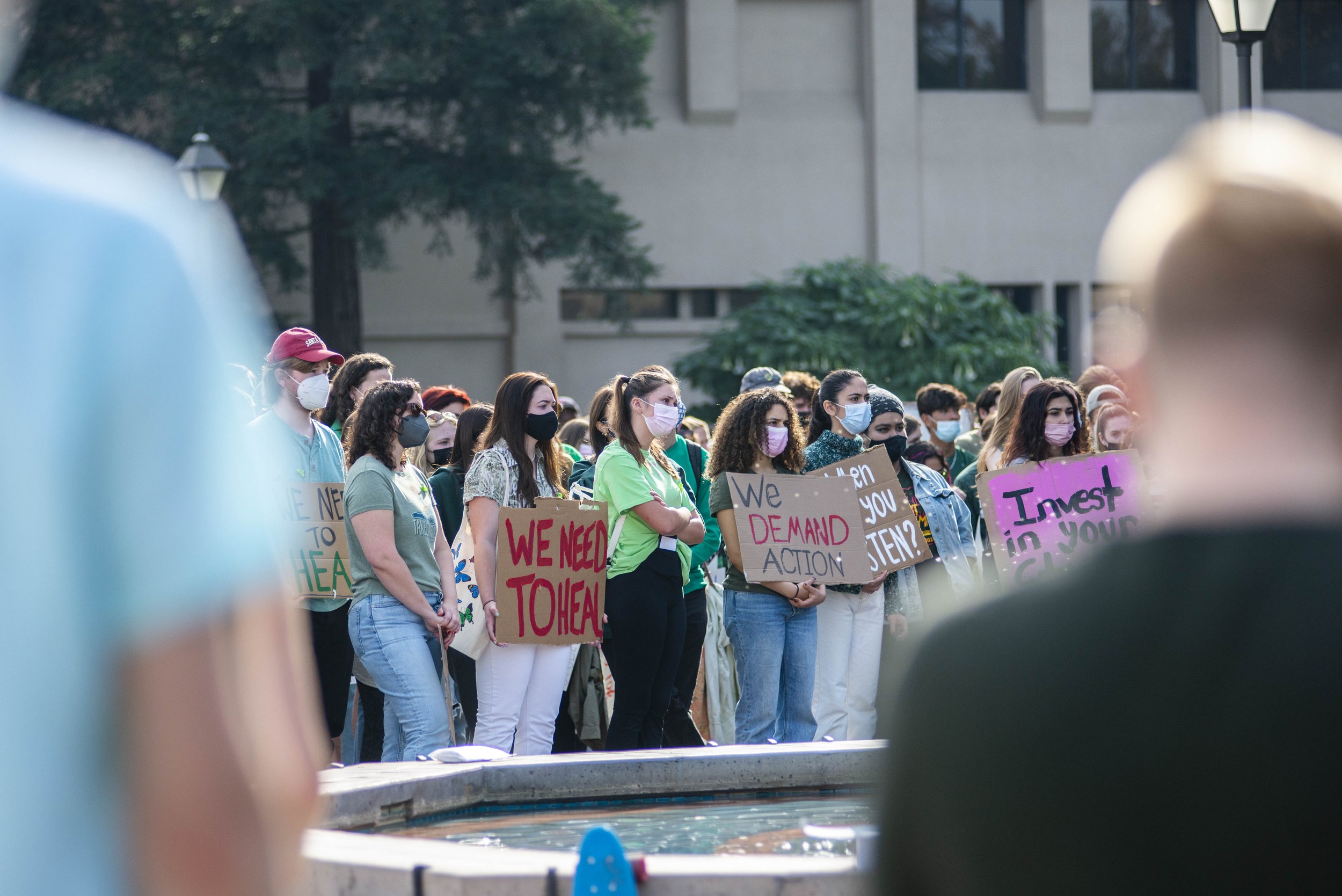
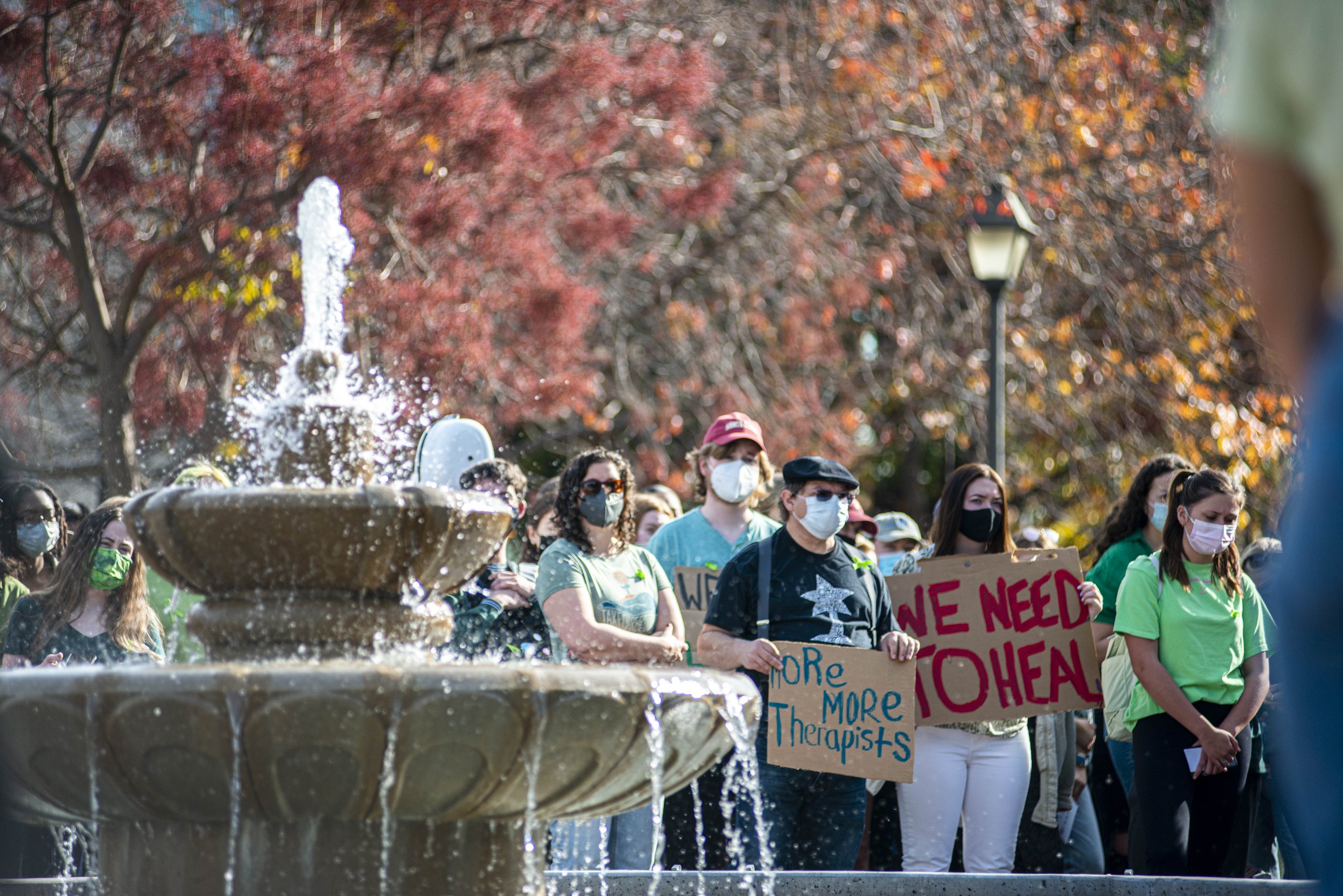
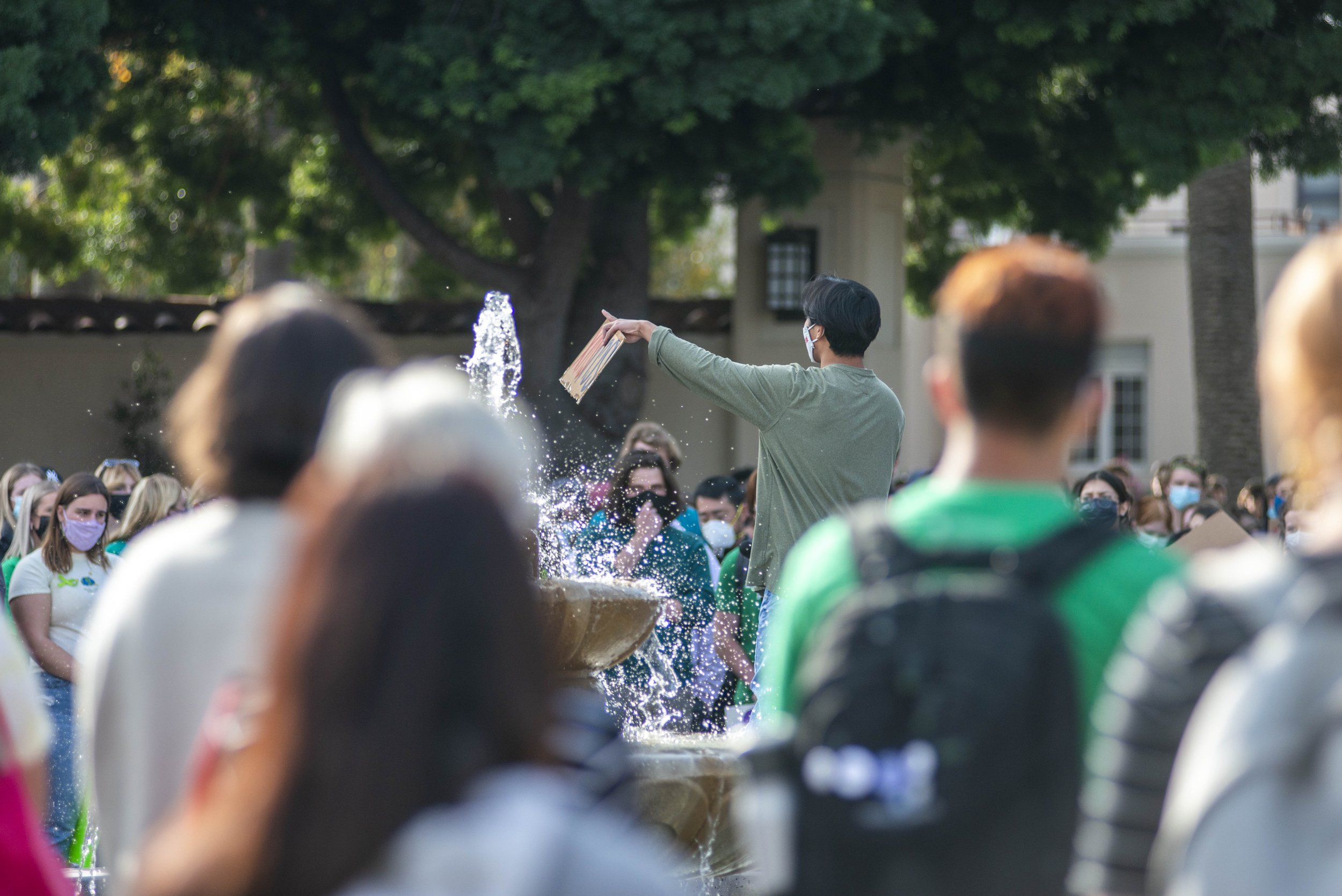
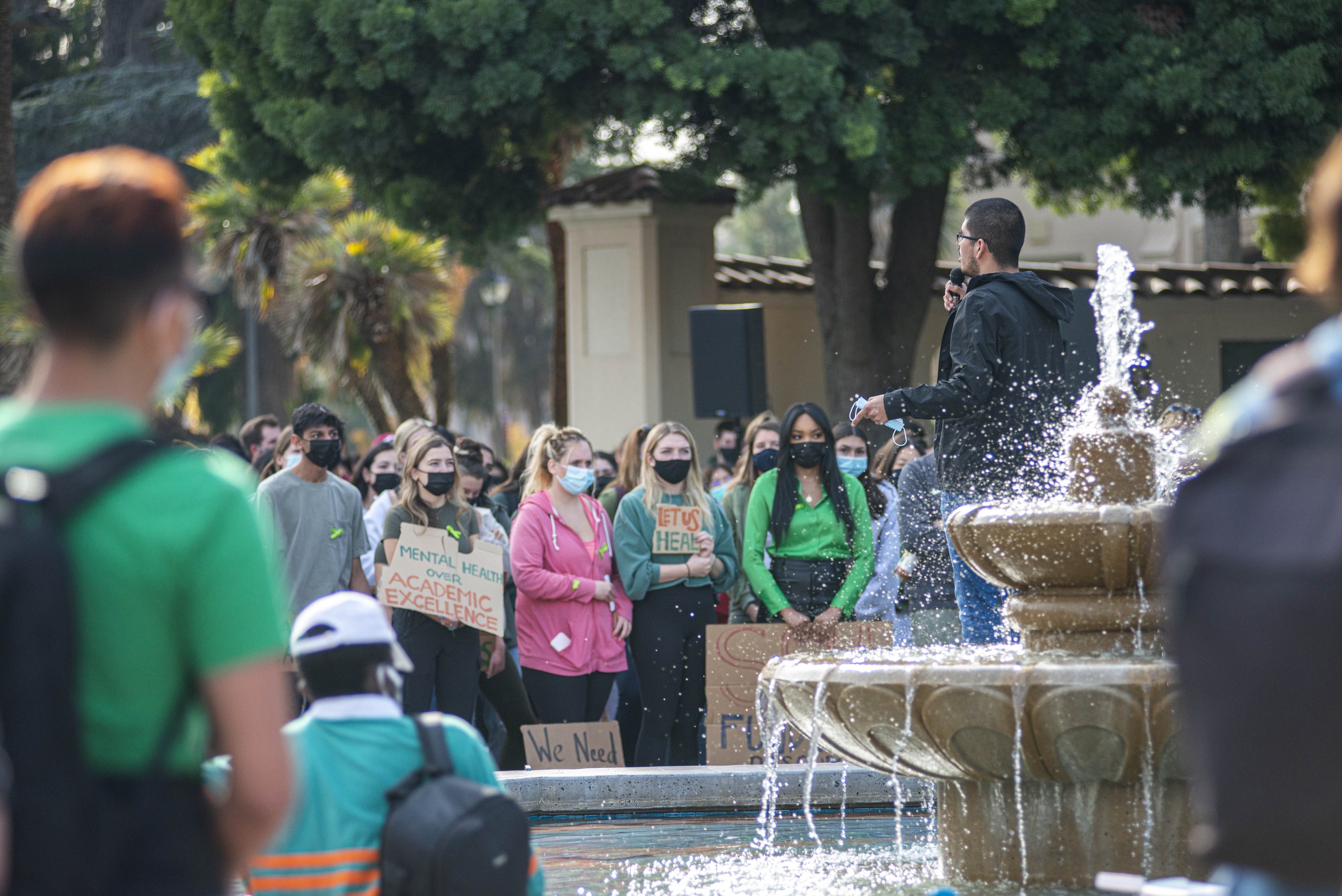
Photo Credit: Mako Watanabe
Hundreds of Santa Clara students gathered by the fountain outside of Vari Hall this afternoon to demand policy changes concerning campus mental health resources and academic leniency for the fall quarter.
The demonstration was organized by junior class senator Megan Wu to address the campus-wide grief and distress following three student deaths in the span of a month. Two of the deaths, including the most recent, were apparent suicides.
Holding signs with phrases like, “How many deaths for the system to change?” and “Listen to students, prioritize mental health,” attendees took turns speaking in an open forum structure. Many shared their personal mental health struggles, some highlighting negative experiences with Santa Clara’s Counseling and Psychological Services (CAPS). Many extended their support to fellow grieving students, and all expressed the urgent need for compassionate administrative action.
Shortly after the almost 2-hour-long demonstration ended, the Board of Trustees alerted Student Body President Abigail Alvarez of the Executive Board’s decision to commit several million dollars to “funding comprehensive and preventative mental healthcare at SCU,” according to an announcement posted on Alvarez’s Instagram, @asgscuprezvp.
The Board’s decision was made in an emergency meeting, according to Alvarez, and there is currently no set limit on how much money they are willing to spend.
A poster made by the demonstration organizers lists the members of Santa Clara’s Board of Trustees
In an email sent to the campus community this evening, Acting President Lisa Kloppenberg confirmed that “significant financial and human resources that will be put into action as soon as possible” to accelerate improvements to Santa Clara’s mental healthcare.
“Santa Clara University is a small school,” junior and demonstration co-organizer Sarah Hutton said in her speech this afternoon. “No one can be more than two degrees of separation from these horrific tragedies. If one of us is not grieving a personal loss or suffering a terrible trauma, then they are helping someone through it.”
Hutton continued, “This requires time and understanding from our professors, from other faculty and staff and from administration.”
A Change.org petition created by senior Molly Tucker on Monday asked the Santa Clara administration for academic leniency and contracted crisis counseling in light of these tragedies. It accumulated 10,000 signatures within the first two days.
In an email sent to students on Monday evening, the university announced a change to the pass/no pass policy for the remainder of the fall quarter, allowing undergraduate students to take any course pass/no pass. The deadline for faculty to submit grades has also been extended. Still, the decision about whether to administer finals has been left to the discretion of each instructor.
The Provost’s Office will be in consultation with faculty about next steps to take in terms of academic leniency for the start of winter quarter, according to Kloppenberg’s email.
“I don't know about you guys, but there's no way in hell that I can focus on my finals,” a first-year student said at the demonstration, holding a sign that read, “SCU SUX.”
He continued, “Cura Personalis — that is a Jesuit principle. That is what Santa Clara prides themselves on as a Jesuit institution. And what they're doing here is not that. They are not showing that they care for the whole person by telling us that we need to ignore the fact that one of our friends has passed in this tragic manner.”
Senior Shenir Dennis echoed similar sentiments.
“You deserve to take time to heal, to process and enjoy the things that really make you happy,” Dennis said, addressing the demonstration attendees. “You deserve that. I want everybody to know that you deserve that.”
She continued, “The way that we have just been asked to continue going is not normal, and it’s not natural.”
Dennis also emphasized the need for more staff of color in CAPS, referencing one of @beingblackatscu’s demands for the university to “ensure that there are at least three BIPOC counselors available for BIPOC students at all times.”
“I think this is a really critical moment to think about how this one issue regarding our mental health resources, or lack thereof here, really connects to the broader social issues at our university,” she said. “We cannot ask our admin to really do anything if we're not also connecting it to the institutional patterns of neglect for so many students, and especially marginalized students on our campus.”
In an impassioned speech, former CAPS staff member Tatyana Foltz encouraged the Santa Clara community to continue advocating for change.
“There are students dying here,” she said. “Every single suicide is a policy failure. Every single overdose is policy failure… Being angry, being disappointed, organizing, demanding the policy change that is needed will get you through this. You will save lives.”
Mental Health Resources:
24-hour Suicide and Crisis Line (Santa Clara County) 650-494-8420 or 408-279-3312
Santa Clara’s 24/7 mental health counseling line is available to all students. Please call 408-554-5220. Students can access licensed clinicians between 5 p.m. and 8 a.m. nights, weekends in all 50 states and abroad.
Living with Loss: Finding our Way Together, free panel discussions on grief and loss especially for our community, on Dec. 6 and Dec. 7 from the School of Education and Counseling Psychology.
